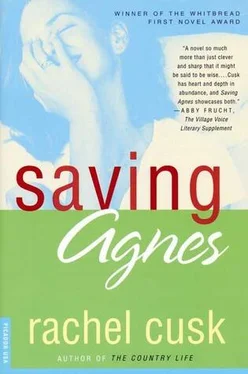‘I don’t want to!’ she had daringly cried.
His face was cloaked in shadow, but all the same she could have sworn she saw him smile. While it was going on, a curious form of revenge had occurred to her. She would do nothing. She would play dead and see how he felt about that. Her body lay inert, as if on a marble slab. Her arms lay still be her sides. Unperturbed, he had merely arranged her limbs for her. She waited for what seemed like hours while he gasped and sighed above her, but he did not seem troubled by her lack of participation. She imagined then that he was raping her. On to the oval blur of his face she imposed that of a stranger. So this is what it feels like, she thought. As he pumped and shuddered, her mind seemed to be growing further and further away until she appeared to be observing events from the ceiling. A lump of anger sat heavily on her chest. She tasted resentment, oppression and rage on her tongue like foreign foods. She had always known those things were there — she had read about them, after all, in books — but it seemed then as if she had simply never chosen to experience them for herself.
‘Thank you,’ he said finally, flopping down beside her while she lay still and opaque as a moonlit sea. ‘Thank you.’
He hugged and kissed her passionately. At one and the same time she suddenly felt deeply, achingly guilty, and terribly afraid. He got out of bed and paused to look down on her benignly and touch her cheek.
‘Agnes, will you marry me?’ he said.
‘What?’ She sat up. ‘What did you say?’
She felt she had finally discovered how to make him love her. She felt punished, grateful, devious and rather sick. It was so easy!
‘I said ,’ he repeated, a smile which in the shadowy room appeared oddly contemptuous spreading slowly over his face. ‘I said, would you like a cup of tea?’
St Joan’s in Highbury Barn was an arkish construct. Agnes would eye it nervously as she passed, disapproving of its squat modern form and wide wooden belly. Such aesthetic disdain was a natural by-road off her main omission. Had the church been more attractive, the implication ran, she would surely have entered it by now. As it was she slunk guiltily past it like an old people’s home in which a decrepit, lonely great-uncle sat forlornly awaiting her visit.
Of late, however, things had changed. Agnes had begun to nurture a dawning awareness of a lack, a growing vacancy at her core. She was ripe for conversion, but while in others such a need brought with it the danger of being brainwashed by a religious sect or enrolling in night classes, Agnes’s mettle had since birth been cast in a mould which dictated its own modus operandi. Feeling the call, then, she had taken her sorrows up the hill to St Joan’s in the hope that by now some wonder of modern theology might have invented a panacea for them.
Once inside she felt slightly disappointed. She had missed the service and the church was empty save for a few worthies busying themselves with the tidying up of hymn-books and parish newsletters. She sat down in one of the wooden pews and waited for her spirit to be claimed. The pedestrian setting, however, did not facilitate access to the Presence. Perhaps she needed incense and a pre-pubescent choir. She found herself thinking about the new issue of Diplomat’s Week. It was to carry another of her articles, which she hadn’t quite finished yet. Merlin crossed her mind and she considered his predicament briefly. She thought about Tom. She ought to phone him.
While it was at least pleasant to have time to think, her ruminations had the effect of making her want to leave the church so that she could attend to them. Her eye wandered impatiently over the altar, behind which hung a crucifix bearing the usual gorged and bloodied simulation of agony. She regarded it indifferently, liiere had been a time when such representations had transfixed her with their animate, piercing gaze, causing her heart to sing with hope and grief. She had changed, she knew, but she didn’t quite know how or when. Like an old car, the addition of new parts over the years had left little of her original material, but her form remained unaltered. Could she, she wondered, still be said to be the same person?
Indeed, it seemed to her now that there had been a time when all her emotions had been as spectacular and colourful as a firework display. She had always known she was meant to feel things. She had believed she was special, so open was she to pain and love. Or was it only that she had indulged such emotions to protect herself from any lengthy contemplation of duller things: boredom, loneliness, failure, all of the things which hovered outside the door like tax inspectors, vigilant and malign?
Sitting there, it all became horribly clear. This dullness that seemed to inhabit every corner of her spirit was nothing but the unpainted, unadorned face of reality. She had no resources herself to enliven it. She had always captured emotions and then visited them like animals at a zoo, saddened by their moulting pelts and mournful eyes. And as for love, well! Had she not once felt herself to be rich with it? Had she not once ruled her world like a queen with palaces? It angered her that John had created a version of herself which she could somehow never imitate afterwards. Try as she might to accommodate them, her subsequent lovers had stood in her life like Ming vases in a council flat.
Agnes sat slumped in her pew for some time. It seemed that she could no longer shelter in the conviction of her own sanctity. Once he had wanted her, but that didn’t mean she was chosen. There was, however, she saw, a certain liberation to be found in ordinariness. Without John, without the myth of his faith in her, the cursed claim it made for her own exceptionalness, she was free to be as miserable as she liked.
IN daydreams Agnes had construed her future as a career woman with elaborations which at the time had not seemed particularly fantastical: herself at the frantic centre of office life, fielding calls and making deals, jittery with caffeine and wearing a suit perhaps. The reality was at once more demanding and more pedestrian.
On Monday morning she sat alone at her desk with an interminable set of galleys for the new issue. A wet stain from a cup of coffee spilled moments before over her leg was beginning to cool, and her trousers adhered damply to the flesh of her thigh. It was eleven thirty and Greta had not yet appeared. The office was overheated, although outside the winter air was unusually damp and sticky. Agnes leafed disconsolately through the pages and grew tearful. She could sit here and weep and no one would notice. This realisation alone was enough to make her cry. Instead she stamped her foot and, in a fit of daring, brought back her hand in order to sweep the pile from the desk and send it flying, disordered, to the floor.
‘Not in yet?’ said Jean, putting her head round the door before Agnes could follow through her sabotaging blow.
‘Not yet.’ Agnes replaced her hand on the desk and suddenly found herself strangely absorbed in her work. She creased her forehead at the page in front of her and scribbled something in the margin. ‘Is that hotel feature ready for layout?’
‘I’m sure I don’t know,’ replied Jean, with the ineffable certainty of her position. She hovered in the doorway. ‘When you have a moment, dear,’ she continued presently, ‘perhaps you could give her a little ring on the telephone. Make sure all is well.’
Jean disappeared from view, leaving Agnes to nurture feelings of resentment that Greta’s failure to come to work should be met with a tender concern somewhat lacking in the admonishments she received for her own shortcomings. In the spirit of defiance she loitered over her proof-reading for a further half-hour before making the call. She was sure Greta would not be at home in any case. Her lapses tended to occur in transit. She would emerge from the grey area of hazard and adventure which was the transport system with the triumphant aspect of one who had overcome great odds and gambled with death to do so.
Читать дальше












